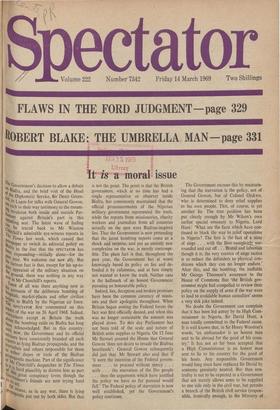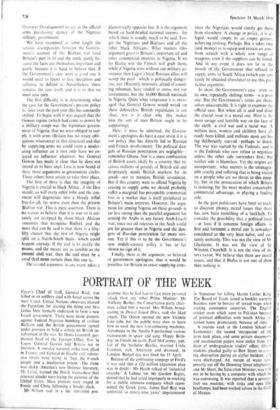Library itirnammoral; issue I n h e Government's decision to allow a debate
'41 %aft-a, and the brief visit of the Head Zlithe Diplomatic Service, Sir Denis Green- to Lagos for talks with General Gowon, each in their way testimony to the mount- ji! revulsion both inside and outside Par- :411N-it against Britain's part in this "Phalling war. The latest wave of feeling 1.1.1 be traced back to Mr Winston ilurchi Ws admirable eye-witness reports in n le Times last week, which caused that tte.WsPaper to switch its editorial policy on b'eaefra to the line that the SPECTATOR has Null expounding—initially alone—for the th Year. We welcome our new ally. But ti'e curious fact is that, except for his up-to- e appraisal of the military situation on 01..8round, there was nothing in any way fl Mr Churchill's reports. hi,'-e-ast of all •was there anything new in accounts of the deliberate bombing of CsPitals, market-places and other civilian Rers in Biafra by the Nigerian air force. st'EcTAToR first commented on this eret of the war on 26 April 1968. Indeed, aberYwhere except in Britain the truth bL)in the bombing raids on Biafra has long 4711 acknowledged. But in this country, ROW, the Government and its official resers have consistently branded all such jo"rrs as lying Biafran propaganda, and the asurnalists and others responsible for them koeither dupes or tools of the Biafran ot ganda machine. Part of the significance is it ;I. Churchill's despatches in The Times tilt hard plausibly to dismiss him as part is not the point. The point is that the British government, which at no time has had a single representative or observer inside Biafra, has consistently maintained that the official pronouncements of the Nigerian military government represented the truth, while the reports from missionaries, charity workers and journalists from all countries actually on the spot were Biafran-inspired lies. That the Government is now pretending that the latest bombing reports come as a shock and surprise, and put an entirely new complexion on the war, is merely contempt- ible. The plain fact is that, throughout the past year, the Government has at worst knowingly based its policy on lies and de- fended it by calumnies, and at best simply not wanted to know the truth. Neither case is the hallmark of an honest Government pursuing an honourable policy. Indeed, lies, deception and broken promises have been the common currency of minis- ters and their apologists throughout. When Britain began arming the Federal forces the fact was first officially denied, and when this was no longer sustainable the amount was played down. To this day Parliament has not been told of the scale and nature of British arms supplies to Nigeria. On 12 June Mr Stewart assured the House that General Gowon 'does not desire to invade the Biafran heartlands': General Gowon subsequently did just that. Mr Stewart also said that if 'it were the intention of the Federal govern- ment . . . to proceed without mercy . . . with . . the starvation of the Ibo people . . . then the arguments which have justified the policy we have so far pursued would fall.' The Federal policy of starvation is now well established, yet the Government's policy continues. The Government excuses this by maintain- ing that the starvation is the policy, not of General Gowon, but of Colonel Ojukwu, who is determined to deny relief supplies to his own people. This, of course, is yet another lie. The true position has been put clearly enough by Mr Wilson's own earlier special emissary to Nigeria, Lord Hunt: 'What are the facts which have con- tinued to block the way to relief operations in Nigeria? The first is the fact of a state of siege . . . with the lbos completely sur- rounded and cut off. . . Brutal and inhuman though it is, the very essence of siege tactics is to reduce the defenders to physical con- ditions which they can no longer endure.' After this, and the bombing, the ineffable Mr George Thomson's assurance to the House of Commons that 'the British gov- ernment might feel compelled to review their policy on the supply of arms if the war were to lead to avoidable human casualties' seems a very sick joke indeed. No doubt the Government can complain that it has been led astray by its High Com- missioner in Nigeria, Sir David Hunt, a man totally committed to the Federal cause. It is well known that, in Sir Henry Wootton's words, 'an ambassador is an honest man sent to lie abroad for the good of his coun- try.' It has not so far been accepted that a High Commissioner, is an honest man sent to lie to his country for the good of his hosts. Any responsible Government would long since have replaced Sir David by someone genuinely neutral. But then neu- trality is not to be expected in a Government that not merely allows arms to be supplied to one side only in the civil war, but permits
Overseas Development) to act as the official arms purchasing agency of the Nigerian military government.
We have examined at some length the serious discrepancies between the Govern- ment's account of the Biafran war (and Britain's part in it) and the truth. partly be- cause the facts are themselves important and partly because it is hard to believe that, if the Government's case were a good one it would need to resort to lies, deception and calumny to defend it. Nevertheless, there remains the case itself, and it is to this we must now turn.
The first difficulty is in determining what the case for the Government's present policy is, since over the past year this has constantly shifted. To begin with it was argued that the Gowon regime (which had come to power by a military coup) was the legitimate govern- ment of Nigeria, that we were obliged to sup- ply it with arms (Britain has no treaty obli- gations whatsoever in this direction) and that by supplying arms we could exert a moder- ating influence on it (not only have we en- joyed no influence whatever, but General Gowon has made it clear that he does not intend us to have any). Less is now heard of these three arguments in government circles. Three others have arisen to take their place.
The first of these is that the integrity of Nigeria is crucial to black Africa : if the lbos secede, so will every other tribe and the con- tinent will degenerate into a bloody tribal free-for-all, far worse even than the present Biafran war. This is mere assertion. There is no reason to believe that it is true (it is cer- tainly not accepted by those black African countries that recognise Biafra), and the most that can be said is that there is a fifty- fifty chance that the rest of Nigeria might split on a North-South basis— which could happen anyway. If the end is to justify the means, and the means are as terrible as the present civil war, then the end must be a good deal more certain than this one is.
The second argument, in any event, takes a
diametrically opposite line. It is the argument based on hard-headed national interest for which there is usually much to be said. For- get the Nigerians and Biafrans and all the other black Africans. What matters (this argument goes) is Britain's important oil and other commercial interests in Nigeria. If we let Biafra win the French will grab them, while if Nigeria wins without our military as- sistance then Lagos's loyal Russian allies will scoop the pool which is politically danger- ous, too. (Recently ministers, afraid of sound- ing inhuman, have tended to stress, not our investments, but the 16,000 British nationals in Nigeria. Quite what vengeance it is envis- aged that General Gowon would wreak on these defenceless British expatriates is not clear, nor is it clear why this makes him the sort of man Britain ought to be supporting).
Here, it must be admitted, the Govern- ment's apologists do have a case (even if it is our policy that has directly led to Russian and French involvement). The political dan- gers of Russian penetration are negligible— remember Ghana. Nor is a mass confiscation of British assets likely by a country that re- ceives millions of pounds of British aid and desperately needs British markets for its goods—not to mention British investment. But if this country were to offend Nigeria by ceasing to supply arms we should probably suffer a marginal but perceptible commercial loss in a market that is itself peripheral to Britain's main interests. However, the argu- ment for arming Nigeria on these grounds is far less strong than the parallel argument for arming the Arabs in any future Arab-Israeli war; since our oil interests in the Arab world are far greater than in Nigeria and the dan- gers of Russian penetration far more seri- ous. Yet if this is to be the Government's new middle-eastern policy it has so far shown no sign of it.
Finally, there is the argument, so beloved of government apologists, that it would be pointless for Britain to cease supplying arms,
since the Nigerians would simply get them from elsewhere. A change in policy, it is al- leged, would simply be an empty gesture, achieving nothing. Perhaps. But it takes time (and money) to re-equip and retrain an army from scratch with a whole new range of weapons, even if the suppliers can be found. And in any event it does not lie in the mouth of the Government that refused to supply arms to South Africa (which can cer- tainly be obtained elsewhere) to use this par- ticular argument.
In short, the Government's case--even on its own, repeatedly shifting, terms—is a poor one. But the Government's terms are them- selves unacceptable. It is right to examine the official case. But when all is said and done the crucial issue is a moral one. Here is the most savage and horrible war on the face of the earth--a civil war and a racial war. A million men, women and children have al- ready been killed, and millions more are be- ing deliberately starved—perhaps to death. The war was started by the Federals, and it is the Federals who now refuse to negotiate unless the other Side surrenders first: but neither side is blameless. Yet the origins are unimportant: what matters is the unimagin- able cruelty and suffering that is being visited on a people who are no threat to this coun- try. but in the prosecution of which Britain is insisting, for the most modest conceivable commercial advantage, in playing a leading role.
In the past politicians have beeli so ready to discover phoney moral issues that there has now been something of a backlash. To consider the possibility that a political issue —at least if it concerns foreign affairs—is first and foremost a moral one is nowadays considered at the very least naive, and cer- tainly unmanly. This was not the view of Mr Gladstone. It was not the view of Sir Winston Churchill. It is not the view of the SPECTATOR. We believe that there are moral issues, and that if Biafra is not one of them then nothing is.



































